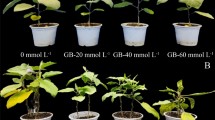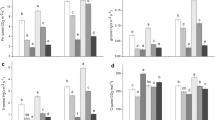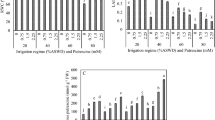Abstract
THE antibiotic chloramphenicol has been found to inhibit accumulation of salt by slices of red beet tissue and carrot tissue without significantly affecting respiration1. This supports the hypothesis that the mechanism of salt uptake is closely related to protein synthesis put forward by Steward and Millar2, as chloramphenicol is a specific inhibitor of protein synthesis.
This is a preview of subscription content, access via your institution
Access options
Subscribe to this journal
Receive 51 print issues and online access
$199.00 per year
only $3.90 per issue
Buy this article
- Purchase on Springer Link
- Instant access to full article PDF
Prices may be subject to local taxes which are calculated during checkout
Similar content being viewed by others
References
Sutcliffe, J. F., Nature, 188, 94 (1960).
Steward, F. C., and Millar, F. K., Symp. Soc. Exp. Bot., 8, 367 (1954).
Stout, P. R., and Arnon, D. I., Amer. J. Bot., 26, 144 (1939).
Bowling, D. J. F., and Weatherley, P. E. (in preparation).
Author information
Authors and Affiliations
Rights and permissions
About this article
Cite this article
BOWLING, D. Effect of Chloramphenicol on the Uptake of Salts and Water by Intact Castor Oil Plants. Nature 200, 284–285 (1963). https://doi.org/10.1038/200284b0
Issue Date:
DOI: https://doi.org/10.1038/200284b0
This article is cited by
Comments
By submitting a comment you agree to abide by our Terms and Community Guidelines. If you find something abusive or that does not comply with our terms or guidelines please flag it as inappropriate.



